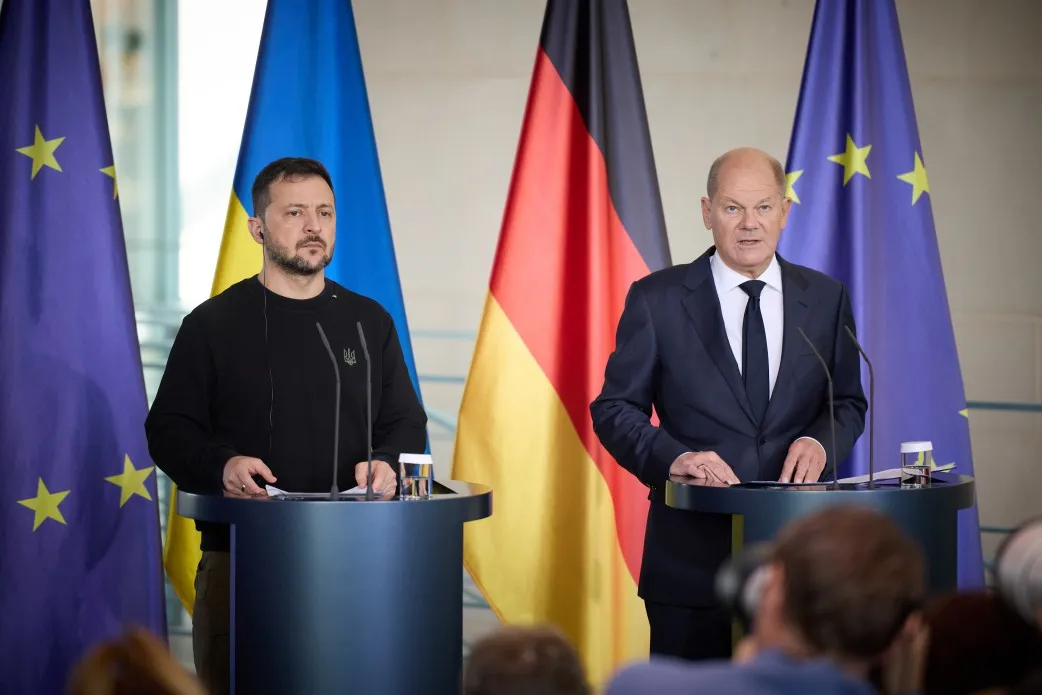We’re at the point of decision in two realms of terrible, and needless, conflict: Ukraine and Southwest Asia. Will it be diplomacy, or the short road to World War III?
In Ukraine, the on-the-ground military, economic and social situation exposes the pretense that Ukraine can be “victorious” over Russia, as the collective West demands. Desertions by troops, territory lost, equipment destroyed, and basic economic sectors which are now dysfunctional are the worsening features of the situation. Nevertheless, acting President Volodymyr Zelenskyy yesterday finished a blitz tour of European capitals—Paris, Rome, London—promoting his “victory plan.” It was received as if it were realistic. At each stop came dissociated remarks about defeating Russia. Italian Prime Minister Giorgia Meloni spoke blithely of hosting a Ukraine recovery conference in Rome in 2025! In London yesterday, Zelenskyy met with Prime Minister Keir Starmer and the new NATO Secretary General Mark Rutte, who spoke triumphantly about how NATO can defeat Russia, no matter what.
On Oct. 14, European Union foreign ministers will meet in Brussels on the topics of providing more military and energy aid to Ukraine. On Oct. 17-18, NATO defense ministers meet in Brussels on more military aid.
All the while, the question hangs in the air: Will the United States give formal approval to Ukraine for use of long-range weapons deep into Russia, defying President Putin’s emphatically clear pronouncement that that means NATO is at war with Russia? Reports are that the U.S. military is fortunately pushing back against this decision, which is favored by the State Department/National Security Council crazies’ wing of the Biden Administration. But pushback is no salvation. A decisive shift against the warfare madness must be made.
In Southwest Asia, the question hangs in the air: Will the crazed Netanyahu IDF bomb Iran, bringing on retaliation, and engagement of U.S. forces in full combat, escalating to nuclear obliteration? The Israel Defense Forces are on a rampage, continuing to bomb Gaza and southern Lebanon. Since Wednesday, Oct. 9, Israeli forces have fired on three United Nations installations in Lebanon, run by the UN Interim Force in Lebanon UNIFIL. They deliberately hit a UNIFIL observation tower in the coastal city of Naqoura, injuring two Indonesian Blue Helmet soldiers.
Former UN weapons inspector Scott Ritter said today at the International Peace Coalition meeting that, “we’ve never been closer to nuclear demise than we are today.” Ritter pointed out that Iran’s nuclear technology capability means that it is “not a large technological leap to have a device ready for fissile material,” so that Iran could produce “a nuclear gun” in a very short period of time. Israel has nuclear weapons, which no one talks about. And above all, Iran is strategically aligned with fellow BRICS member Russia.
This was vividly exemplified today by the meeting in person of Iranian President Masoud Pezeshkian and Russian President Vladimir Putin at a conference in Ashgabat, Turkmenistan. The photos of their cordiality—this was their first meeting, as well as their words of friendship and mutual commitment—convey to anyone with reason that targeting Iran is a targeting of Russia, and must stop. However, the Global NATO War Party continues, and backs Netanyahu and IDF genocide.
The International Peace Coalition, meeting today for its 71st week in a row, heard the report on Iran from Ritter, and a strategic evaluation—as summarized above, by Helga Zepp-LaRouche, leader of the Schiller Institute, and founder of the IPC. We are facing “two powderkegs,” each about to explode into nuclear war, she stressed. Zepp-LaRouche called for an all-out mobilization to bring forward the danger we face, calling it a “high red-alert.” The Schiller Institute will circulate the Scott Ritter video report and transcript.
Mobilization in Europe and in the United States is hard, but especially necessary. One notable alarm was sounded yesterday by the longstanding Newsweek publication in the U.S. It ran a lengthy exclusive article, featuring an interview with former Russian Ambassador to the U.S. Anatoly Antonov. Authored by Tom O’Connor, Newsweek’s Foreign Policy & Deputy Editor, National Security and Foreign Policy, the article is headlined, “Exclusive: Russia Ambassador Exits U.S. with Warning of ‘Nuclear Catastrophe.’” Antonov is quoted as saying: “Washington is continuing a dangerous discussion about the possibility of giving Ukrainians a permission to strike deep into Russian territory with Western long-range missiles. … They refuse to take into account the clear warnings of the President of the Russian Federation that a ‘green light’ for such attacks would mean NATO’s direct involvement in the conflict, with all the following conclusions on our part.”







